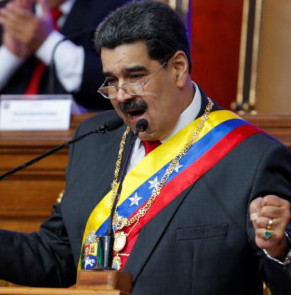
© Andrei Rubtsov/TASS
Top stories from the Russian press on Thursday, June 8th, prepared by TASS
The sabotage of the Togliatti-Odessa ammonia pipeline sinks the prospects for extending the Black Sea grain initiative; Russia backs Saudi Arabia's bid to join the BRICS club; and the US and China attempt to reboot their strained bilateral relations with Blinken’s potential Beijing visit. These stories topped Thursday’s newspaper headlines across Russia.
Vedomosti: Togliatti-Odessa ammonia pipeline sabotage sinks grain deal extension prospects
A section of the Togliatti-Odessa ammonia pipeline in the Kharkov Region was seriously damaged, marking the first attack since the start of Russia’s special military operation on this critical piece of infrastructure, the operational reactivation of which was one of the essential preconditions for Russia to extend the grain deal. On June 7, the Russian Defense Ministry's press service said that Ukrainian sabotage and reconnaissance groups had purposefully destroyed the ammonia pipeline. According to experts interviewed by Vedomosti, the incident may seriously hinder the extension of the Black Sea grain deal.
The operation of the ammonia pipeline while hostilities are ongoing is questionable, and any attempts to restart it until the situation stabilizes would be risky, Finam analyst Alexey Kalachev told the newspaper. The expert believes that TogliattiAzot will effectively lose this pipeline until the conflict comes to an end.
According to Dmitry Ofitserov-Belsky, a researcher at the Russian Academy of Sciences’ Primakov Institute of World Economy and International Relations (IMEMO RAS), the explosion on the Togliatti-Odessa ammonia pipeline makes any chance of its reactivation and a further extension of the grain deal after July 17 increasingly illusory. According to the expert, the most recent extension on May 18 was a gesture by Moscow aimed at appeasing one of the agreement's primary benefactors, Turkish President Recep Tayyip Erdogan, who was then in the midst of a tough re-election battle.
The expert noted that Ukraine and the West have never actually fulfilled the terms of the agreement. Rather, they needed it in order to export grain and have time to redirect grain export flows via land routes through Eastern Europe, where several countries eventually agreed with the European Commission on transit, subject to a ban on direct shipments until September, he added.
Izvestia: Moscow backing Riyadh’s BRICS membership bid
Russia supports Saudi Arabia's application for admission to the BRICS group, Russian diplomatic sources told Izvestia. However, new candidates must meet certain conditions, which China places great emphasis on, the sources noted. Overall, dozens of countries are seeking to become members of the BRICS bloc, the newspaper wrote.
"We see no obstacles for such a large economy as that of Saudi Arabia joining the BRICS," one of the sources said. At the same time, there are a number of requirements that countries vying for BRICS membership must meet, and Beijing prioritizes them, according to one of Izvestia's sources. The process of standardizing a consistent set of requirements for all BRICS candidate countries is currently ongoing.
Saudi Arabia is also interested in joining the BRICS Development Bank, which the desert kingdom could potentially join before officially joining the organization itself. The development of a single BRICS currency, which will be used in international settlements between the group's member countries as an alternative to the dollar, is now on the bank’s agenda, Izvestia said.
According to Artem Adrianov, a researcher at the Institute of International Studies at Moscow State Institute of International Relations (MGIMO University), there is now a trend in the Middle East as a whole toward participating in non-Western organizations, such as the Shanghai Cooperation Organization (SCO) and BRICS.
"Riyadh is looking for new ways to mitigate the risks of a potential confrontation with Iran, following the loss of US influence in the area. Strong relations with China and Russia have become an alternative for the Saudis in order to consolidate relations with Iran," the expert said.
Vedomosti: Iran announces plans to create gas hub with Russia, Turkmenistan, Qatar
The Iranian government has unveiled ambitious plans to create a gas hub in the Asaluyeh industrial zone in Bushehr Province on the Persian Gulf, with the participation of Russia, Qatar and Turkmenistan. Experts told Vedomosti that Russia could supply gas to Pakistan and India via Iran.
According to Iranian Oil Minister Javad Owji, Tehran is seeking to turn the Persian Gulf and Asaluyeh into a gas hub with the help of Russia, Turkmenistan and Qatar. The oil minister did not elaborate on the project details, but noted that the necessary preparations and planning are underway.
The gas hub was previously mooted as part of a promising gas distribution project in Turkey that has been in the works since October 2022, which European countries could use to purchase Russian gas. In addition, Russia and Iran expanded their bilateral cooperation in the oil and gas industry last year amid growing anti-Russian sanctions.
It could prove difficult, however, to use an Iranian gas hub for transfers of gas to the West, for example, through Turkey to Europe, Igor Yushkov, senior analyst at the National Energy Security Fund, told Vedomosti. According to him, Turkey would likely seek to interfere in the project and "promote" its own hub. "Such supplies would not make economic sense for Russia either, due to the high transportation costs. It would make more sense for Russia to supply gas to Pakistan and India via Iran, as these countries are potentially large-scale consumers. Such supplies would require building a gas pipeline," the expert added.
At the same time, according to the expert, Russia can already supply Iran with significant amounts of gas via a gas pipeline through Turkmenistan, up to 30 billion cubic meters per year.
Nezavisimaya Gazeta: US, China try to reset bilateral dialogue with likely Blinken visit
Although neither Washington nor Beijing has officially confirmed it, US Secretary of State Antony Blinken will visit China, Nezavisimaya Gazeta writes, adding that a meeting with Chinese President Xi Jinping is not out of the question. According to the newspaper, this may confirm that the two heavyweight powers have set about repairing their strained relations. If it transpires, the trip would serve to further the high-level talks that Xi and US President Joe Biden agreed upon at the G20 conference in Bali, Indonesia, last November.
CNN, citing unnamed sources, reported that Blinken will travel to China. Washington is also seeking to arrange for Treasury Secretary Janet Yellen and Commerce Secretary Gina Raimondo to visit China.
Vasily Kashin, a senior researcher at the Higher School of Economics (HSE University), told Nezavisimaya Gazeta that, "after Blinken himself canceled his visit following the balloon incident, the Chinese decided to let him stew in his own juices for a while. But a visit is necessary, and China has now condescended to allowing the Secretary of State come. It's very possible that he'll meet with Xi."
Foreign companies were particularly concerned by an editorial in the People's Daily, the Chinese Communist Party's flagship publication, calling for toughening the battle against corruption, the newspaper wrote.
"China's interest in foreign investment has significantly waned compared to previous years," Kashin said, adding that, "China will continue to put pressure on enterprises from unfriendly countries. However, the anti-corruption drive is a domestic activity, not a crusade against outsiders."
Izvestia: Iran and Saudi Arabia eyeing military alliance, rapprochement in full bloom
Tehran has invited Riyadh to establish a regional coalition for ensuring maritime security. Iranian Navy Commander Rear Admiral Shahram Irani said that a number of countries in the Persian Gulf region, including Iran and Saudi Arabia, plan to form a new maritime coalition for conducting operations in the northern Indian Ocean, according to Iran’s Mehr news agency. The normalization of relations between the two long-time cross-Gulf rivals is in full swing, as Iran’s diplomatic mission to Saudi Arabia resumed its work this week, Izvestia writes. According to experts interviewed by the newspaper, the situation is beneficial for Russia.
The idea of creating such an organization originally came from Russia, Middle East expert and writer Andrey Ontikov told Izvestia, adding that he believes that the situation is generally beneficial for Russian interests. "This is a positive course of events for Moscow, because the stabilization of the situation in this territory will have a similar impact on the neighboring regions, both in Central Asia and potentially in the South Caucasus region," the expert noted.
According to Vasily Ostanin-Golovnya, research fellow at the Department of Middle Eastern and Post-Soviet Eastern Studies of the Russian Academy of Sciences’ Institute of Scientific Information on Social Sciences, the further normalization of relations between Iran and Saudi Arabia is yielding positive results. According to the expert, such initiatives are positive for Russia, which will lead to a diminished role for non-regional, outside actors, primarily the United States and the United Kingdom.









